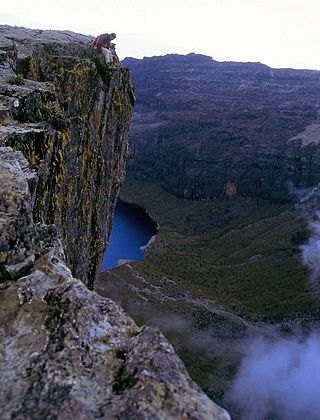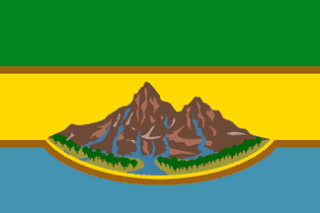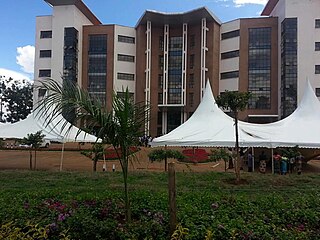Related Research Articles

Meru County is one of the 47 counties of Kenya located in the former Eastern Province. It borders Isiolo County to the north, Tharaka-Nithi County to the South, Nyeri County to the southwest and Laikipia County to the west. Meru County has a population of 1.35 million people. It is home to the Meru people.

The Meru or Amîîrú are a Bantu ethnic group that inhabit the Meru region of Kenya. The region is situated on the fertile lands of the north and eastern slopes of Mount Kenya in the former Eastern Province.
Meru North District was an unconstitutionally created district of Kenya, located in that country's Eastern Province. In 1992, it was split from Meru District, along with Meru Central District, Meru South District (Nithi), and Tharaka District. Since the High Court's decision in September 2009, the territory of Meru North has been part of Meru County.
Meru South District, also known as Nithi District, was an unconstitutionally created district of Kenya, located in the country's Eastern Province. In 1992, it was split from the large Meru District, along with Meru Central District, Meru North District, and Tharaka District. In September 2009, the Supreme Court ruled that its creation was unconstitutional, and that it belonged in Tharaka-Nithi District.

Tharaka-Nithi County is one of the 47 counties of Kenya. It was created from Kenya's Eastern Province. The county has an area of 2609 km2 and as of the 2019 census a population of 393,177.

Kitui County is one of the 47 counties of Kenya in the former Eastern Province of Kenya. Its capital and largest town is Kitui. Mwingi is also another major urban centre. The county has a population of about 1.2 million people and an area of 30,496 km2. It lies between latitudes 0°10 South and 3°0 South and longitudes 37°50 East and 39°0 East.

The constituencies of Kenya are used to elect members of the National Assembly, the lower chamber of the Kenyan Parliament. In accordance with Article 89 of the 2010 Constitution of Kenya, there are 290 constituencies, based on a formula where these constituencies were to be delineated based on population numbers. Each constituency returns one Member of National Assembly. The constituencies are further divided into electoral wards.

Chuka is a town on the eastern slopes of Mount Kenya, about 65 km south Of Meru Town. It falls within Tharaka-Nithi County and the former Eastern Province. Between 1992 and 2009, Chuka was the capital of Tharaka-Nithi District. Tharaka Nithi District was further split into Meru South and Tharaka Districts with Chuka remaining the Capital of Meru South. Later, Meru South and Tharaka were amalgamated into Tharaka-Nithi County.
Rongai Constituency is an electoral constituency in Kenya. It is one of eleven constituencies in Nakuru County. The constituency has eight wards, all electing Members of County Assembly (MCAs)for the Nakuru County Assembly. The constituency was established for the 1988 elections when it was carved out of Nakuru North Constituency.
Karachuonyo Constituency is an electoral constituency in Kenya. It is one of eight constituencies in Homa Bay County. The current member of parliament is Andrew Adipo Okuome.
Kibwezi Constituency was an electoral constituency in Kenya. It was one of five constituencies in Makueni District. The constituency was established for the 1988 elections. After the 2010 constitution, there were six constituencies set up in Makueni County, with Kibwezi Constituency being split into Kibwezi West Constituency and Kibwezi East Constituency.
Baringo East Constituency was a former electoral constituency in Kenya. It was one of three constituencies in Baringo District, Rift Valley Province. The constituency was established for the 1963 elections. The constituency had nine wards, all electing councillors for the Baringo County Council.
Bobasi is an electoral constituency in Kenya. It is one of nine constituencies in Kisii County. The constituency was established for the 1988 elections. It was one of three constituencies in the former Gucha District.
North Mugirango is one of four constituencies in Nyamira County. In 1966 the North Mugirango Constituency was split into West Mugirango and a smaller North Mugirango. The name was changed to Borabu / North Mugirango Constituency in 1974. In 1987 the name changed back to North Mugirango. Prior to 2013, it was formally known as North Mugirango (Borabu) Constituency after which Borabu constituency was hived off, hence its reversion to the name Mugirango Constituency.

Isiolo South Constituency is an electoral constituency in Kenya. It is one of two constituencies of Isiolo County. The constituency has nine wards, all electing councillors to the Isiolo County Council. The constituency was established for the 1966 elections.
Suba North, formerly known as Mbita Constituency from 1966 to 2013, is an electoral constituency in Kenya. It is one of eight constituencies in Homa Bay County. It was created in 1966 after Lambwe Constituency was divided to Mbita and Ndhiwa constituencies.

The counties of Kenya are geographical units created by the 2010 Constitution of Kenya as the new units of devolved government. They replaced the previous provincial system. The establishment and executive powers of the counties is provided in Chapter Eleven of the Constitution on devolved government, the Constitution's Fourth Schedule and any other legislation passed by the Senate of Kenya concerning counties. The counties are also single-member constituencies which elect members of the Senate, and special woman members to the National Assembly.

Sub-counties, formerly known as Districts, are the decentralised units through which government of Kenya provides functions and services. At national level, sub-counties take a more administrative function like security, statistical purposes, provision of government services, etc. Even though the sub-counties are divisions of counties, powers to create new national sub-counties lies with the national government. As of 2023, there are 314 sub-counties, compared to 290 constituencies. A deputy county commissioner is appointed by the state to lead each sub-county. The sub-counties are further divided into divisions, locations and sub-locations.
Tharaka-Nithi District was one of the districts of Kenya located in that country's Eastern Province from 1992 to 1998. Its former boundaries now corresponds to those of Tharaka-Nithi County.

H.E. Francis Nyamu Kagwima is a Kenyan politician, born in 1952. He is the second and incumbent Deputy Governor of Tharaka Nithi County in Kenya after having been cleared on a Jubilee Party ticket in the Kenyan election as Onesmus Muthomi Njuki's running mate. Before being elected the Deputy Governor, he served as the Member of Parliament for Tharaka Constituency from 1988 to 1997 and was re-elected for the 2002-2007 term.
References
- ↑ "Politics and Parliamentarians in Kenya 1944–2007" (PDF). Center for Multiparty Democracy. Archived from the original (PDF) on 28 February 2008.
- ↑ "Registered voters per polling station by electoral area/ward and constituency" (PDF). Electoral Commission of Kenya. Archived from the original (PDF) on 29 September 2007.